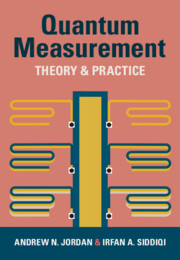Book contents
- Frontmatter
- Dedication
- Contents
- Preface
- Acknowledgments
- List of Symbols
- 1 Introduction to Quantum Physics and Measurement
- 2 Projective Measurement
- 3 Generalized Measurem
- 4 Weak Measurement
- 5 Continuous Measurement: Diffusive Case
- 6 Continuous Measurement: Quantum Jump Case
- 7 Linear Detectors
- 8 Quantum Amplification
- 9 Measurement-Related Phenomena and Applications
- 10 Feedback and Control
- 11 Epilogue: What Does It All Mean?
- Appendix A Review of Classical Probability Theory
- Appendix B Mixed Quantum States
- References
- Index
3 - Generalized Measurem
Published online by Cambridge University Press: 10 May 2024
- Frontmatter
- Dedication
- Contents
- Preface
- Acknowledgments
- List of Symbols
- 1 Introduction to Quantum Physics and Measurement
- 2 Projective Measurement
- 3 Generalized Measurem
- 4 Weak Measurement
- 5 Continuous Measurement: Diffusive Case
- 6 Continuous Measurement: Quantum Jump Case
- 7 Linear Detectors
- 8 Quantum Amplification
- 9 Measurement-Related Phenomena and Applications
- 10 Feedback and Control
- 11 Epilogue: What Does It All Mean?
- Appendix A Review of Classical Probability Theory
- Appendix B Mixed Quantum States
- References
- Index
Summary
Chapter 3 takes a step beyond textbook measurements and introduces generalized measurements, beginning with the motivating experiment of an optical polarization measurement with a calcite crystal. In this case, wavefunction collapse is imperfect, and we will discuss how to describe and predict the statistics of outcomes and how to assign postmeasurement states. This topic is closely related to Bayesian probability theory, and we discussed a “Quantum Bayes Rule.”
Information
- Type
- Chapter
- Information
- Quantum MeasurementTheory and Practice, pp. 46 - 63Publisher: Cambridge University PressPrint publication year: 2024
